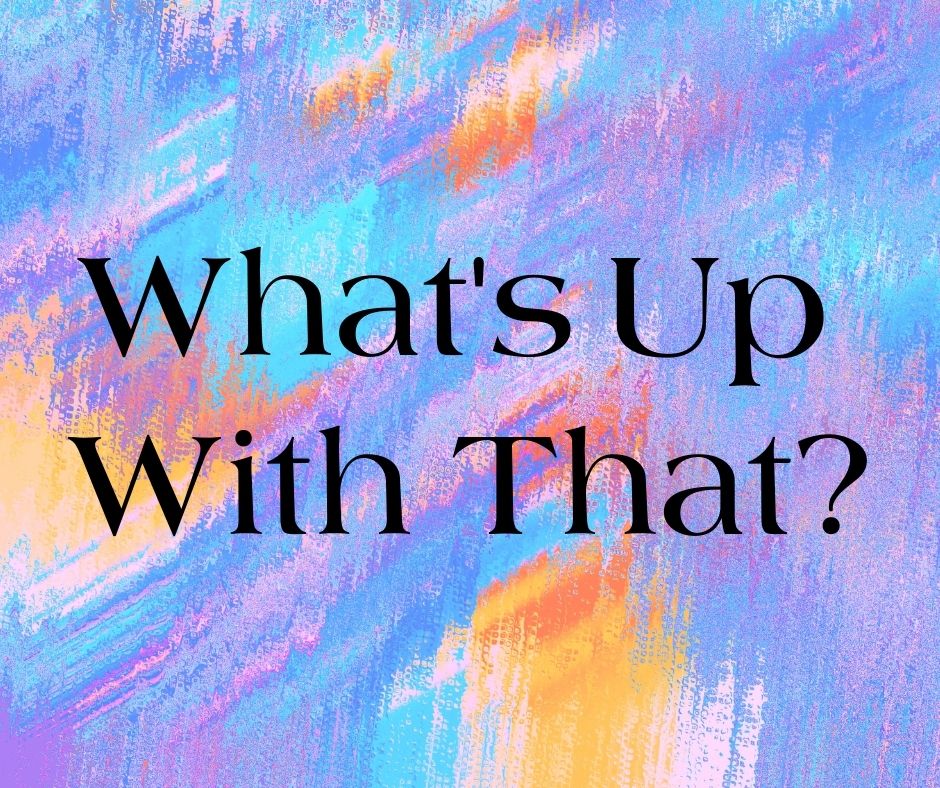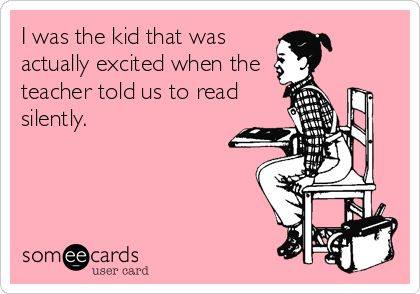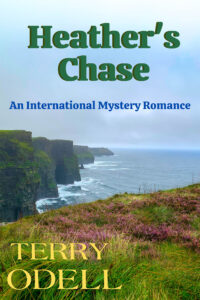There’s a famous quip from Woody Allen that goes like this, “I took a course in speed reading. I read War and Peace in twenty minutes. It was about Russia.” There’s a lot of truth in those lines because when writers read for research (and pleasure) they need to find that balance between speed, comprehension, and production. It all comes down to efficiency.
Some folks naturally read faster than others. During my research for this Kill Zone piece, I sourced statistics that the average person reads at the speed of about 200 to 250 words per minute (wpm). That’s like a typical 12 point page spaced at 1.15 inches in 60 seconds. Speed demons can go as high as 400 wpm, but there’s a distinct line where speed becomes counter-productive, and the ability to comprehend and retain those words drastically diminishes.
Other stats I found compared reading speed to conversation cadence. Most of us talk at about 150 wpm which, I read, is the optimal spacing for podcasting and audio books. Cattle auctioneers bark at around 250 wpm, and I once worked with a cop who spoke so fast that no one could understand him—probably blurting out about 300 or more. It was a thing of beauty to listen to his evidence in court.
 Here are some other speed reading tidbits.US President John Kennedy reportedly read three major newspapers before his morning coffee cooled. JFK’s rate was around 1,100 and he, himself, said it was his ability to skim for what he was interested in. The World Speed Reading Championship has a six-time winner, Anne Jones, who read at 4,200 wpm with a recorded comprehension at 67 percent.
Here are some other speed reading tidbits.US President John Kennedy reportedly read three major newspapers before his morning coffee cooled. JFK’s rate was around 1,100 and he, himself, said it was his ability to skim for what he was interested in. The World Speed Reading Championship has a six-time winner, Anne Jones, who read at 4,200 wpm with a recorded comprehension at 67 percent.
Then there’s Kim Peek. He’s a savant who has memorized over 9,600 books. No one knows how he does it because Kim’s corpus callosum has been missing since birth. That’s the nerve bundle connecting the right and left cerebral hemispheres.
Anyway, back to us mortal writers. We have to read to be able to produce writing. Most of us, myself included, are bookies. We love to read as well as write. Like me, you’re probably a closet bibliomaniac who practices the art of tsundoku. (I linked these words to Wikipedia—you’re welcome.)
Another quote, while I’m in quoting mode, is from Stephen King himself who savantly said, “To be a good writer you must do two things. Read a lot and write a lot. If you don’t have the time for reading, then you do not have the tools for writing.” I’ll take King’s advice any day, but the 64-thousand dollar question is, “How do I read quickly but still write efficiently?”
To start with, there are certain limitations built into us writing mortals. They involve interactions between the eye and the brain. Brains are linguistically programmed through instinct. We naturally learn to speak. However, we have to be taught to read, and then we have to practice. A lot, if we’re going to be good readers who can efficiently transpose information into intelligible writing.
 When you look at images on a page—letters, words, sentences, paragraphs, and symbols—light reflects from the page or screen to the back of your retina. Here a tiny, dot-like feature called your fovea centralis takes the information and passes it to your cerebral cortex for processing. Your cortex decides whether to use the information, store it, or chuck it.
When you look at images on a page—letters, words, sentences, paragraphs, and symbols—light reflects from the page or screen to the back of your retina. Here a tiny, dot-like feature called your fovea centralis takes the information and passes it to your cerebral cortex for processing. Your cortex decides whether to use the information, store it, or chuck it.
As amazing as your fovea is, it has a limited capacity to function with speed. Foveas are focused fellas, and they only see about three words at a time. That’s because only so much light passes into cell cones in the center of the fovea. Light coming from peripheral page regions, like words to the left and right, fades into the fog of cell rods that aren’t so good at transmitting useful reading information.
There’s more to this reading science than meets the eye. You’re programmed to read in small chunks at a time. Reading scientists call this fixations and saccades. Fixations are the spots where your fovea stops and saccades are the jerk actions between the stops that keep your eye moving across the page.
From what I read and retained, your fovea fixation lasts from about a quarter-second to a full-second. This depends on your mental focus and how much your brain decides that particular info-bit is worth to you. A saccade period is about a tenth-second. Saccades are pretty predictable, and the only control you have is to decide how much you want to skim.
You can’t will or teach your fovea to act faster or look farther. It’s only going to take in about three words between stops. What you can do, however, is to exercise your cortex to retain more, and that comes from reading lots.
When you read a lot, you become more familiar with words that your brain can find useful. You expand your vocabulary as well as your overall knowledge. More understood and informative words equals higher efficiency when it comes to reading fast and retaining more. However, there comes a point where you’re reading too fast and miss too much.
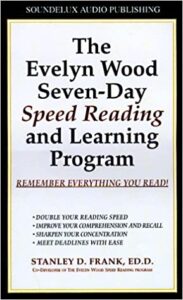 So, is there such a thing as efficient speed reading? A balance? Well, let’s look back to where this craze came from and went to. Travel back to 1958 and meet Evelyn Wood who wrote Reading Skills. She was a Utah school teacher who used a three-point system to make her kids better readers. Evelyn recognized these three efficient reading methods:
So, is there such a thing as efficient speed reading? A balance? Well, let’s look back to where this craze came from and went to. Travel back to 1958 and meet Evelyn Wood who wrote Reading Skills. She was a Utah school teacher who used a three-point system to make her kids better readers. Evelyn recognized these three efficient reading methods:
Method 1 — Take more information in at a time. She encouraged scanning by moving a finger or pen across a page to increase saccade action.
Method 2 — Eliminate subvocalization. This is the little voice in your head that wants to read out loud rather than be still and absorb information.
Method 3 — Eliminate regressive eye movements. Evelyn encouraged students to read it right the first time and not to keep going back over things.
Evelyn Wood was probably the mother of all speed reading courses. She went on to offer Reading Dynamics and made a ton of money by teaching adults to read faster and absorb better. Some historians question Wood’s effectiveness at significantly improving speed, but you can’t argue with her worldwide exposure.
Forward to 2020 and the app age. This speed reading thing hasn’t gone away. Google “speed reading” and you’ll find tools like Spritz, Spreeder, Outread, Acceleread, and Reedy to help reduce your TBR pile. Do any of these apps really work? I don’t know, because I have my own system for researching and writing that I’d like to share with you.
As I mused, there’s a balance between time and efficiency. It depends on what you want to do with your reading material. I’m not one to “speed read” a novel, but it pays to rip through resource material as quickly as possible to write an article like this.
Case Study: Is Speed Reading Efficient for Writers?
I spent five hours researching this post. I have a fair amount of experience doing online articles, as I spent two years working with my daughter in her content writing agency. That business pays by the article. Not the word count or by time. A typical content piece is 2,200 words and to make a decent hourly return, you have to be somewhat speedy in reading your research.
I used the keywords “Speed Read” to “Google” information. I found 14 suitable articles online ranging from Psychology Wiki (which I had no idea existed—you’re welcome again) to Wired, Lifehacker, and the BBC. I copied the content and pasted it on a Word.doc which is what I religiously do for research. I formatted the doc in Ariel 10 point with 1.15 spacing and set the color on black with a white background.
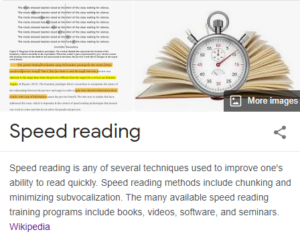 Then, I printed each article on 8 ½ x 11 and went at them with a yellow highlighter and a red pen. I used a side page for black-inked notes. By this time, my cortex knew what it was looking for so, as my fovea followed my saccade spacing, I yellow-highlighted interesting stuff and red underlined really interesting stuff. I then made black notes of key points and I moved it along.
Then, I printed each article on 8 ½ x 11 and went at them with a yellow highlighter and a red pen. I used a side page for black-inked notes. By this time, my cortex knew what it was looking for so, as my fovea followed my saccade spacing, I yellow-highlighted interesting stuff and red underlined really interesting stuff. I then made black notes of key points and I moved it along.
The printed 14 documents contained 21,823 words. That’s an average of 1,559 per piece. Out of the 5 hours in research time, about 2 ½ were spent in reading the printed docs and making notes. 2 ½ hours is 150 minutes, so my words-per-minute was 145. That’s no speed demon by any measure.
However, my comprehension, retention, and piece production were (in my opinion) reasonably efficient. Sure, I could probably have scanned the stuff at 3 times the rate. But, I wouldn’t have been able to efficiently write this 1,593-word article in 1.75 hours. That’s composing at 906 words per hour or 15.1 words per minute.
Do I have room to increase my writing efficiency? Certainly. Probably we all do. But is speed reading to save research time worth the reduced value of the final product? I say no.
What about you Kill Zoners? What’s your view on speed reading, and what tips on writing efficiency do you have? Please drop them in the comment box.
___
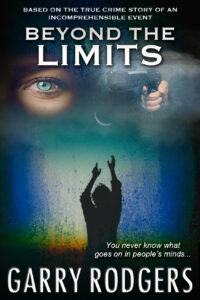 Garry Rodgers is a retired homicide detective with a second career as a coroner investigating sudden, strange, and unexplained deaths. Now Garry has reinvented himself as an indie writer who’s working on a series of based-on-true-crime stories. His latest venture, Beyond The Limits – Book #7, is scheduled for release in early January, 2021.
Garry Rodgers is a retired homicide detective with a second career as a coroner investigating sudden, strange, and unexplained deaths. Now Garry has reinvented himself as an indie writer who’s working on a series of based-on-true-crime stories. His latest venture, Beyond The Limits – Book #7, is scheduled for release in early January, 2021.
Besides writing at the Kill Zone and on his popular blog at www.DyingWords.net, Garry Rodgers spends his spare time putting around the saltwater near his home on Vancouver Island in British Columbia, Canada. To his aghast, there was a skim of frost on Garry’s windshield this morning.


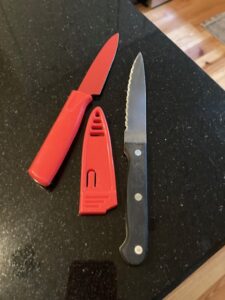


 Back in 2017, Jim wrote
Back in 2017, Jim wrote  Being an author requires a long-term game plan. There is no get-rich-quick scheme. For most of us, one book won’t produce enough income to survive. Thus, we need a strategic approach to building our brand. The #1 way to do that is to grow our email list, and a free ebook campaign can accomplish that goal.
Being an author requires a long-term game plan. There is no get-rich-quick scheme. For most of us, one book won’t produce enough income to survive. Thus, we need a strategic approach to building our brand. The #1 way to do that is to grow our email list, and a free ebook campaign can accomplish that goal.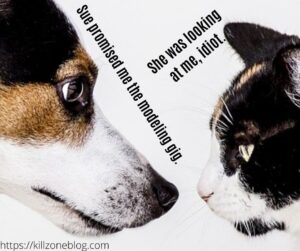 BookFunnel membership comes with free promotions. Hosts offer several different promo opportunities.
BookFunnel membership comes with free promotions. Hosts offer several different promo opportunities. If you like BookFunnel, you will love
If you like BookFunnel, you will love  Let’s stroll down memory lane.
Let’s stroll down memory lane.

